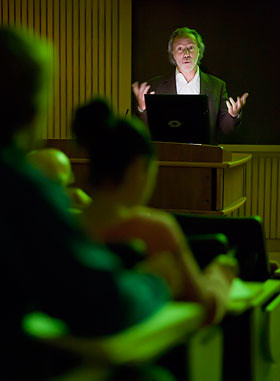Photos showing flesh-eating bacteria and a polluted river of dead fish drew gasps from those attending Friday’s science colloquium in Love Auditorium as Amazon Conservation Team president Mark Plotkin emphasized the importance of protecting the Amazon land and culture.
Ian Starr ’04, who works with Plotkin, organized their visit to campus to talk about their work with indigenous people.
“They’re paying the price for something we’ve been causing,” Plotkin said of how climate change and deforestation are harming the rainforest and the indigenous people who live there. He added that the health and environmental devastation they are experiencing is headed our way.
“Ever since 9/11, we’ve learned that whatever happens in far-off places affects us right here at home; we are living in an ever-shrinking planet,” he said.
 |
| Mark Plotkin talks to students Friday in Love Auditorium. (Photo by Andy Daddio) |
An ethnobotanist, Plotkin has been working with elder shamans in Central and South America to learn about medicinal plants for the past 20 years.
“It was a great fit to bring Mark and the work of ACT to °Ä˛ĘżŞ˝±, primarily because of the interdisciplinary nature of ethnobotany and our methodology,” said Starr.
Plotkin kept the audience captivated with stories describing the vast knowledge shamans possess about nature, medicine, and their land. He also explained how ACT facilitated the collaboration between the indigenous people and Google Earth to protect the rainforest by using satellite imagery to monitor illegal loggers as well as raise global awareness.
More in-depth information about this project was discussed earlier in the day by Plotkin at an Environmental Studies luncheon at ALANA Cultural Center.
Although the partnership between ACT and the indigenous people of the Amazon involves an exchange of knowledge, Plotkin emphasized that we have much more to learn from them than vice versa.
“His whole point is learning from the shamans — rather than us saying what we have to teach these people, they have so much to teach us,” said Professor Chris Vecsey, whose students in Core 176: Native American Indians read Plotkin’s book, Tales of a Shaman’s Apprentice.
Students had the opportunity to ask Plotkin questions about the book when he visited their class Friday morning.
“He opened my mind to new possibilities and that science is not restricted to common Western practices,” said first-year Sean Spellberg, who attended Plotkin’s presentations throughout the day.
“The brown bag and lecture showed us how the Amazonian Indian culture can be preserved through the simple acknowledgement and respect of the global community,” said sophomore Margaret Brower.